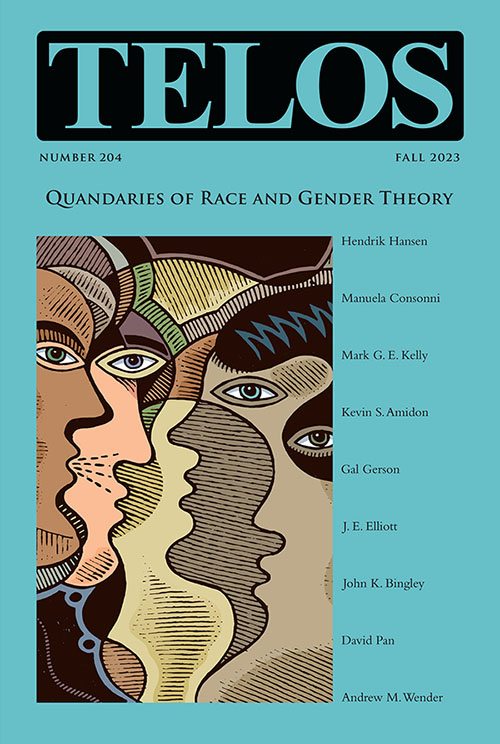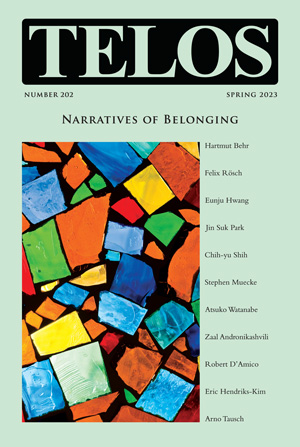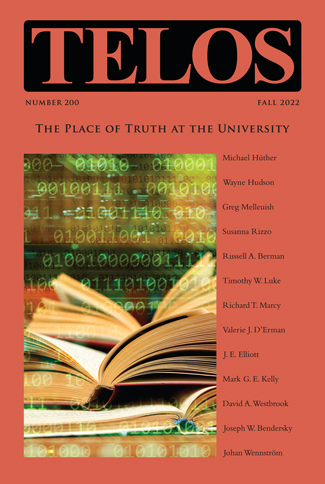By David Pan · Wednesday, October 18, 2023 Telos 204 (Fall 2023): Quandaries of Race and Gender Theory is now available for purchase in our store. Individual subscriptions to Telos are also available in both print and online formats.
 Old-style leftists have puzzled over how today’s left-liberals have abandoned traditional left-wing goals such as reducing class inequality and improving working-class standards of living. A key reason lies with the shifting of the politics of class. As Paul Piccone and Fred Siegel argued over thirty years ago in these pages, the problem of class is no longer a question of capitalists against workers. According to a recent Gallup poll, 61 percent of U.S. adults own stock, and such capitalist ownership, while a good way to increase wealth, is no longer the preserve of the ruling class and does not by itself confer much power. Rather, the ruling class that exercises real power consists not of owners but primarily of a bureaucratic class of managers in corporations, government, non-profits, universities, and the media. In spite of this shift, theories developed over a century ago continue to shape current leftist perspectives. Dominated by a socialist perspective, left-wing social policy fails to recognize and address the new contours of class division. As a result, it continues to employ a framework that is based on an anti-capitalist and anti-market agenda that tries to manipulate outcomes to promote socialist goals, precisely the methods of a managerial class. Old-style leftists have puzzled over how today’s left-liberals have abandoned traditional left-wing goals such as reducing class inequality and improving working-class standards of living. A key reason lies with the shifting of the politics of class. As Paul Piccone and Fred Siegel argued over thirty years ago in these pages, the problem of class is no longer a question of capitalists against workers. According to a recent Gallup poll, 61 percent of U.S. adults own stock, and such capitalist ownership, while a good way to increase wealth, is no longer the preserve of the ruling class and does not by itself confer much power. Rather, the ruling class that exercises real power consists not of owners but primarily of a bureaucratic class of managers in corporations, government, non-profits, universities, and the media. In spite of this shift, theories developed over a century ago continue to shape current leftist perspectives. Dominated by a socialist perspective, left-wing social policy fails to recognize and address the new contours of class division. As a result, it continues to employ a framework that is based on an anti-capitalist and anti-market agenda that tries to manipulate outcomes to promote socialist goals, precisely the methods of a managerial class.
Continue reading →
By Telos Press · Wednesday, April 12, 2023 Telos 202 (Spring 2023): Narratives of Belonging is now available for purchase in our store. Individual subscriptions to Telos are also available in both print and online formats. Online subscribers have access to the full issue at the Telos Online website. The following is an excerpt from the issue’s introduction by Hartmut Behr and Felix Rösch, who are the issue’s guest editors.
Introduction: Narratives of Belonging—The Interrelation between Ontological-Epistemological Observations and Narrative Methodology
Hartmut Behr and Felix Rösch
1. Introduction
 In a recent editorial, the Lancet reported that one of the consequences of pandemics is the detrimental impact “on the mental health of affected populations,” and the current COVID-19 one is no different. Since its outbreak at the end of 2019, “depressed mood, anxiety, impaired memory, and insomnia” are constant companions of people around the world. Many even experience “stress, burnout, depression, and post-traumatic stress disorder.” Amongst its concerns, the Lancet notes the rising “misuse of substances” as a consequence of these mental health problems.[1] One of the reasons for this global mental health crisis is the way the pandemic affects peoples’ practices of community building and rituals of belonging. Having to wear masks, being required to keep at least 1.5 meters apart, not being able to meet (vulnerable) friends and family members, and even more drastic measures like weeklong lockdowns fundamentally disrupted everyday lives and reduced opportunities to socialize. What is normally taken for granted is being challenged. Around the world, these measures have been met by increasing demonstrations, often based on conspiracy theories and against commonsense precautions for preventing a potentially lethal disease. This conflict between reasonable precaution and emotional stress and pressure suggests disruptions of common narratives of belonging. In a recent editorial, the Lancet reported that one of the consequences of pandemics is the detrimental impact “on the mental health of affected populations,” and the current COVID-19 one is no different. Since its outbreak at the end of 2019, “depressed mood, anxiety, impaired memory, and insomnia” are constant companions of people around the world. Many even experience “stress, burnout, depression, and post-traumatic stress disorder.” Amongst its concerns, the Lancet notes the rising “misuse of substances” as a consequence of these mental health problems.[1] One of the reasons for this global mental health crisis is the way the pandemic affects peoples’ practices of community building and rituals of belonging. Having to wear masks, being required to keep at least 1.5 meters apart, not being able to meet (vulnerable) friends and family members, and even more drastic measures like weeklong lockdowns fundamentally disrupted everyday lives and reduced opportunities to socialize. What is normally taken for granted is being challenged. Around the world, these measures have been met by increasing demonstrations, often based on conspiracy theories and against commonsense precautions for preventing a potentially lethal disease. This conflict between reasonable precaution and emotional stress and pressure suggests disruptions of common narratives of belonging.
Continue reading →
By David Pan · Monday, October 3, 2022 Telos 200 (Fall 2022): The Place of Truth at the University is now available for purchase in our store. Individual subscriptions to Telos are also available in both print and online formats.
 The place of truth at the university has always been elsewhere. Scientific conclusions are after all hypotheses, subject to continuing examination and critique in a process that forever defers the arrival at a final truth. In addition to this unbridgeable temporal distance from truth, there is a spatial distance to the extent that the university is subject to a larger purposive context that stands outside of scientific activity itself. A researcher can be objective by being non-prejudicial in collecting facts and weighing arguments but can never be neutral in terms of the goals of the research, which must always be established before the research begins and from outside of the research project itself.[1] Research cannot begin until an interest in some question has been expressed, and such an interest has generally not been up to the researcher to decide. Whether the goal of medical research will be to protect humans from a virus or attack humans with a virus will be determined by the sponsor of the research rather than the researcher, who at best may decline to take part in some forms of research. If the determiners of the goals of the university are not the professors themselves but the society that sponsors their work, it is within this external values framework that the truth of the university must be found. The place of truth at the university has always been elsewhere. Scientific conclusions are after all hypotheses, subject to continuing examination and critique in a process that forever defers the arrival at a final truth. In addition to this unbridgeable temporal distance from truth, there is a spatial distance to the extent that the university is subject to a larger purposive context that stands outside of scientific activity itself. A researcher can be objective by being non-prejudicial in collecting facts and weighing arguments but can never be neutral in terms of the goals of the research, which must always be established before the research begins and from outside of the research project itself.[1] Research cannot begin until an interest in some question has been expressed, and such an interest has generally not been up to the researcher to decide. Whether the goal of medical research will be to protect humans from a virus or attack humans with a virus will be determined by the sponsor of the research rather than the researcher, who at best may decline to take part in some forms of research. If the determiners of the goals of the university are not the professors themselves but the society that sponsors their work, it is within this external values framework that the truth of the university must be found.
Continue reading →
By Russell A. Berman · Wednesday, April 28, 2021 Criticism of identity politics is hardly new. The insistence on—or “celebration” of—fractional community identities rather than a common good was presented as an explanation for Hillary Clinton’s defeat in the 2016 presidential election. No coalition of separate groups will ever be able to muster the political magnetism of an inclusive rhetoric of national solidarity. That is the first problem: how identity politics divides, rather than unites.
However in addition to the problems of fragmentation and exclusion, the very focus on “identity,” a cultural and psychological concept, has always distracted from material issues of political economy, redirecting debate toward symbols and selfhood. Christopher Lasch labeled this a Culture of Narcissism as early as 1979. At stake is both a tendency toward subjectification within contemporary society and a transformation of the—often primarily academic—discussion about this society, as critical attention shifted toward subjective elements rather than discriminatory conditions and economic processes. If you want to hide class difference, identity politics is just what you need.
Continue reading →
By Peter Brandt · Wednesday, April 28, 2021 This is a more extensive version of an essay by Peter Brandt that appeared in Neue Gesellschaft/Frankfurter Hefte in March 2021. Brandt comments on identity politics here. Translated by Russell A. Berman, with comments here.
In the wake of the Black Lives Matter movement in the United States and the United Kingdom, growing numbers of statues of historical figures have been toppled, beheaded, or turned upside down. It has been a matter primarily of figures charged with participation in the extermination, oppression, and enslavement of non-white ethnic groups, such as the famous generals of the Confederacy during the American Civil War of 1861–65. The matter gets complicated because not a few of these targets of symbolic attacks or executions embody quite different qualities. Several of the American founding fathers, the first constitutional state, were slaveowners, for example, the primary author of the Declaration of Independence of 1776 and later third president of the United States, Thomas Jefferson, a figure of the Enlightenment and a wide-ranging intellectual. Although never a rigorous defender of slavery, he viewed blacks—in contrast to Native Americans—as inferior.
Continue reading →
By Peter Brandt · Wednesday, April 28, 2021 The following blog post originally appeared at Blog politische Ökonomie. Peter Brandt is commenting on the controversy surrounding an essay by Wolfgang Thierse, translated here. See the related position paper here and a separate article by Brandt here. Translated by Russell A. Berman, with comments here.
During the past few weeks the debate over identity politics and viewpoint diversity in Germany has been unfolding. The starting point was an article in the Frankfurter Allgemeine by Wolfgang Thierse, not known for eccentric positions, concerning the conduct of the debate around the themes of racism, postcolonialism, and gender.
In his opinion piece, Thierse criticizes the claim by sexual and other minorities to define their own collective identity (hence “identity politics”), and what is right and tolerable or intolerable for them, rather than engaging in an open and controversial debate. The accusation that something is hurtful therefore, Thierse argues, often displaces an argumentative response.
Continue reading →
|
|
 Old-style leftists have puzzled over how today’s left-liberals have abandoned traditional left-wing goals such as reducing class inequality and improving working-class standards of living. A key reason lies with the shifting of the politics of class. As Paul Piccone and Fred Siegel argued over thirty years ago in these pages, the problem of class is no longer a question of capitalists against workers. According to a recent Gallup poll, 61 percent of U.S. adults own stock, and such capitalist ownership, while a good way to increase wealth, is no longer the preserve of the ruling class and does not by itself confer much power. Rather, the ruling class that exercises real power consists not of owners but primarily of a bureaucratic class of managers in corporations, government, non-profits, universities, and the media. In spite of this shift, theories developed over a century ago continue to shape current leftist perspectives. Dominated by a socialist perspective, left-wing social policy fails to recognize and address the new contours of class division. As a result, it continues to employ a framework that is based on an anti-capitalist and anti-market agenda that tries to manipulate outcomes to promote socialist goals, precisely the methods of a managerial class.
Old-style leftists have puzzled over how today’s left-liberals have abandoned traditional left-wing goals such as reducing class inequality and improving working-class standards of living. A key reason lies with the shifting of the politics of class. As Paul Piccone and Fred Siegel argued over thirty years ago in these pages, the problem of class is no longer a question of capitalists against workers. According to a recent Gallup poll, 61 percent of U.S. adults own stock, and such capitalist ownership, while a good way to increase wealth, is no longer the preserve of the ruling class and does not by itself confer much power. Rather, the ruling class that exercises real power consists not of owners but primarily of a bureaucratic class of managers in corporations, government, non-profits, universities, and the media. In spite of this shift, theories developed over a century ago continue to shape current leftist perspectives. Dominated by a socialist perspective, left-wing social policy fails to recognize and address the new contours of class division. As a result, it continues to employ a framework that is based on an anti-capitalist and anti-market agenda that tries to manipulate outcomes to promote socialist goals, precisely the methods of a managerial class. 








